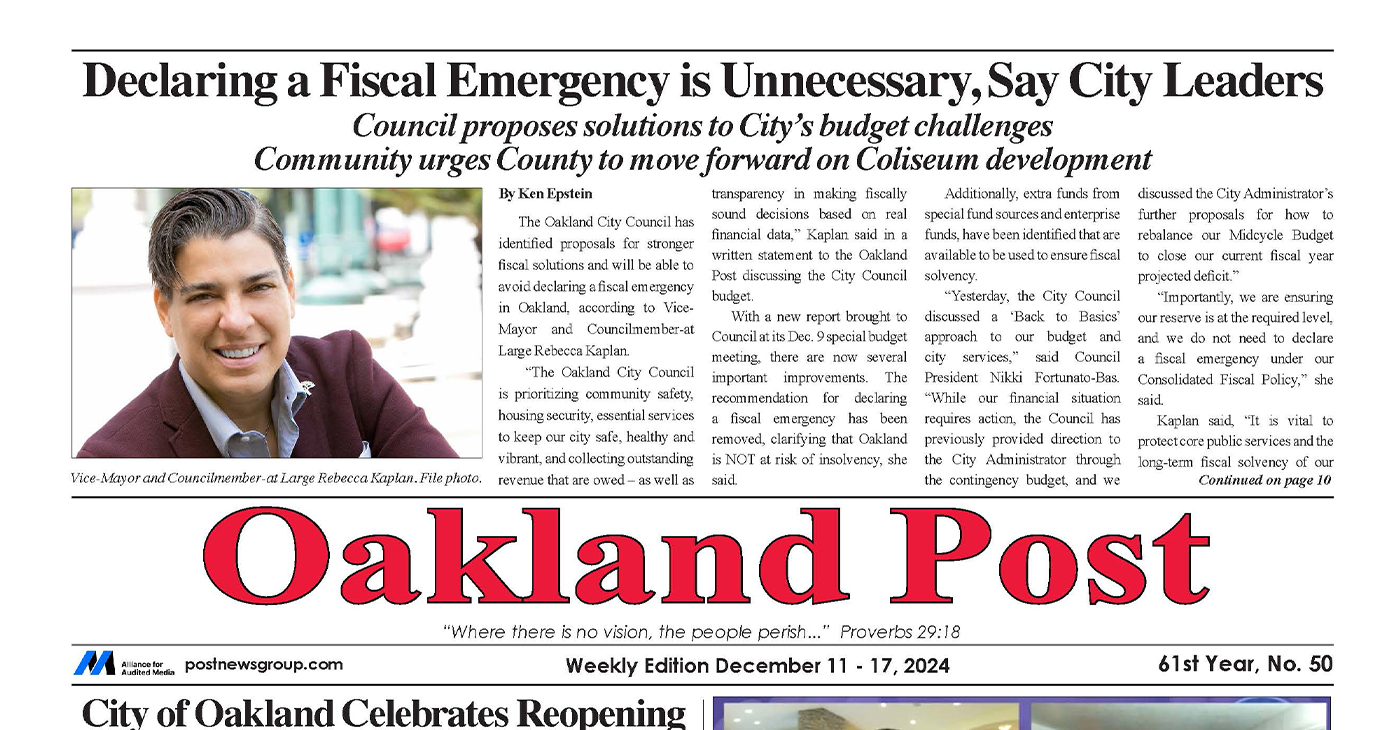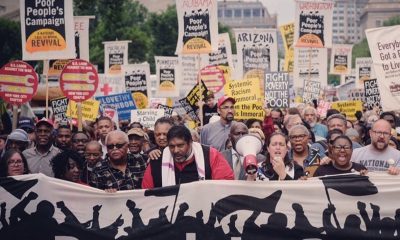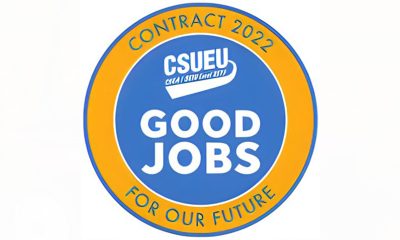Business
For Many Low-Income Workers, Calling In Sick is a Luxury

In this Friday, May 15, 2015 photo, Shannon Henderson buckles her son, Justin, 1, into his car seat for the ride to his father’s house before she goes to her job as a part-time customer service representative at Wal-Mart in Sacramento, Calif. Henderson is one of an estimated 40 million American workers for who calling in sick is a luxury. If they dont work, they dont get paid. (AP Photo/Rich Pedroncelli)
ANNE D’INNOCENZIO, AP Retail Writer
NEW YORK (AP) — For Shannon Henderson, getting a cold or flu could be the difference between putting food on the table and going hungry.
As a part-time customer service representative at a Wal-Mart in Sacramento, California, Henderson is one of an estimated 40 million American workers for who calling in sick is a luxury. If they don’t work, they don’t get paid.
“I’m super afraid of getting sick,” said Henderson, 29, who slathers on hand sanitizer at work in hopes of fending off illness.
Paid sick leave is the next frontier in the fight for the country’s lowest earners. Some of the same workers’ rights groups that grabbed headlines recently by pushing companies for wage hikes are steering the conversation toward paid sick leave. The debate has caught the attention of governments and companies alike.
President Barack Obama is calling for federal legislation that would require companies to guarantee workers paid sick days. And since San Francisco started requiring that in 2007, nearly 20 cities and three states — Connecticut, Massachusetts and California — have passed similar measures. New York, Maryland and other states are considering laws too. And McDonald’s Corp. and Wal-Mart Stores Inc., which have announced wage hikes recently, are making changes to their paid sick leave policies.
“Paid sick days are a job issue,” said Ellen Bravo, executive director for Family Values @ Work, a network of coalitions fighting to pass paid sick days and family leave policies. “When you don’t have sick pay, you get docked.”
The new focus comes amid wide disparities between the benefits received by the top and bottom rungs of the corporate ladder. Sixty-one percent of U.S. workers get at least one paid sick day, according to a national compensation survey of employee benefits conducted last year by the Bureau of Labor Statistics.
But only 20 percent of workers whose wages are at the bottom 10 percent get paid sick leave, compared with 87 percent in the top 10 percent. There’s also a difference when comparing part-time and full-time employees: Seventy-four percent of full-time workers get paid sick leave, while 24 percent of part-time workers do, according to BLS.
Despite the disparities, some industry groups are fighting against laws requiring sick leave pay. Lisa Horn, director of congressional affairs at Society for Human Resource Management, a human resource management trade group, says many companies are leaning toward policies that lump sick, personal and vacation days together. But she says laws force companies to scale back on those benefits to keep down the costs associated with people taking sick days off.
“These mandates have a chilling effect on employers’ ability to innovate and be creative with their leave options,” she said.
Eileen Appelbaum, senior economist at Center for Economic and Policy Research, says mandated sick pay has not had a negative impact on some companies that have been surveyed. According to a survey the group did of businesses in Connecticut, which has required paid sick leave since 2012, one-third of workers took no paid sick leave. “They treat them as insurance,” she said.
Big companies with operations nationwide are changing their paid sick leave policies ahead of legislation.
In February, Wal-Mart, the largest U.S. private employer, said within about a year it would end the one-day wait for sick pay for all full-time U.S. workers. That’s a change from the current system that requires Wal-Mart workers in the U.S. to wait a day to use sick days, which means they have to use personal days on the first day out sick. (Full-time workers can earn up to two personal days and about six days of sick leave pay a year.)
Randy Hargrove, a Wal-Mart spokesman, said the company also is reviewing its sick policy for part-time workers, who account for half of its 1.3 million-person workforce in the U.S. Currently, if part-time workers are ill, they have to use personal days.
McDonald’s is taking a different approach by lumping personal and sick days together. Starting July 1, full-time and part-time workers at company-owned restaurants will begin to accrue personal paid time off after one year of service that can be used for sick leave.
An employee working an average of 20 hours a week will be eligible to accrue about 20 hours of paid time off a year. If employees don’t take the earned time off, they will be paid for the value of it. The benefits apply to only McDonald’s company-owned restaurants, which represent about 10 percent of its more than 14,300 restaurants nationwide.
“We’ve listened to our employees and learned that — in addition to increased wages — paid personal leave … would make a real difference in their careers and lives,” McDonald’s President and CEO Steve Easterbrook said in a statement.
Workplace experts expect other companies to follow Wal-Mart and McDonald’s. “More employers are voluntarily adopting paid sick leave programs,” says Mark Girouard, an employment attorney at Nilan Johnson Lewis who represents national retailers.
That is welcome news to workers who struggle to make ends meet when they take a sick day.
Henderson, the customer service rep, works under the 34 hours per week average that would make her a Wal-Mart full-time employee, so the company’s policy change doesn’t affect her. She said she’s looking forward to California’s sick leave mandate, which goes into effect in July and allows workers one hour of paid sick leave for every 30 hours worked.
The single mother of an infant makes $10 an hour — an annual paycheck of a little over $16,000. Henderson, who says she can’t afford to take time off, has gone to work with a runny nose and no voice. But last year, she said she took time off when she was pregnant because of morning sickness.
“We are human,” said Henderson, who is a member of a labor-backed group OUR Walmart, which has pressed the retailer for higher wages and expanded benefits. “We can’t control being sick.”
Copyright 2015 The Associated Press. All rights reserved. This material may not be published, broadcast, rewritten or redistributed.
Activism
BWOPA Honors Black Leadership and Legacy at 2024 Ella Hill Hutch Awards Dinner
On Dec. 5, BWOPA held its Annual Ella Hill Hutch Awards Ceremony, at the Fairmont Claremont Hotel in the Oakland/Berkeley Hills. At the event, the group comprised of Black women from various professional backgrounds, honored distinguished local and state leaders whose contributions have shaped civic engagement and advanced critical social issues impacting Black communities.

By Oakland Post Staff
Black Women Organized for Political Action (BWOPA) is a statewide non-profit advocacy and membership organization committed to solving problems affecting Black Californians.
On Dec. 5, BWOPA held its Annual Ella Hill Hutch Awards Ceremony, at the Fairmont Claremont Hotel in the Oakland/Berkeley Hills.
At the event, the group comprised of Black women from various professional backgrounds, honored distinguished local and state leaders whose contributions have shaped civic engagement and advanced critical social issues impacting Black communities.
The evening was hosted by Dr. Shawna Charles, founder of The Charles Communications Group (CCG) headquartered in Los Angeles. Charles served as mistress of ceremonies.
With a track record of elevating voices and empowering communities, Charles’ leadership and insight brought a certain dynamism to the celebration.
“Each year, this event not only celebrates the enduring legacy of our beloved BWOPA founding member, Ella Hill Hutch, but also reaffirms and amplifies our unwavering commitment to building and sustaining Black political power across California,” said Dezie Woods-Jones, BWOPA founding member and State president.
“Ella Hill Hutch’s trailblazing leadership continues to inspire us as we forge ahead, empowering Black women to lead, advocate, and shape a more equitable future for all,” added Woods-Jones.
This year’s event introduced the DWJ Rising Star Award, honoring young leaders like Solano County Board Supervisors-elect Cassandra James, Danielle Motley-Lewis, Naomi Waters and newly elected State Assemblymember elect Rhodesia Ransom (D-Stockton).
According to organizers, the awardees all exemplify “the next generation of changemakers.”
Other awardees included:
- Lifetime Achievement Awardees: Congresswoman Barbara Lee (D-CA-12) and Alameda County Supervisor Keith Carson
- Man of the Year: Kenneth Maxey, CEO of the Greater SF Bay Area Urban League
- President’s Corporate Award: Yvette Radford, Kaiser Permanente
- In the Spirit of Ella State and Chapter Awards: Dr. Carolyn Greene, Dr. Marcella K. Smith, Dr. Carolyn Drake, Tinisch Hollins, Jackie Jones, Gloria Burgess Johnson, Tamika L’Ecluse, Ellen Nash, Betty Reid Soskin, and Ay’Anna Moody.
BWOPA also celebrated local champions across its chapters, including leaders in voter education, healthcare, criminal justice reform, and community advocacy.
In a statement, BWOPA said, “Honoring Ella Hill Hutch’s legacy, BWOPA recognizes her pioneering efforts as the first Black woman elected to the San Francisco Board of Supervisors. Her tireless work amplifying underrepresented voices continues to inspire BWOPA’s mission to build Black political power across California.”
“We extend our heartfelt thanks to our members, partners and allies who believe in BWOPA’s vision to invest in building power for Black women’s leadership,” said LaNiece Jones, BWOPA State executive director. “Your support ensures that Black women have a voice at decision-making tables locally, regionally, statewide, and nationally, advancing diversity and equity in leadership spaces.”
Activism
Oakland Post: Week of December 11 – 17, 2024
The printed Weekly Edition of the Oakland Post: Week of December 11 – 17, 2024

To enlarge your view of this issue, use the slider, magnifying glass icon or full page icon in the lower right corner of the browser window. ![]()
Activism
Post News Group to Host Second Town Hall on Racism, Hate Crimes
The mission of CRD is to protect the people of California from unlawful discrimination in employment, housing and public accommodations (businesses) and from hate violence and human trafficking in accordance with the Fair Employment and Housing Act (FEHA), Unruh Civil Rights Act, Disabled Persons Act, and Ralph Civil Rights Act. The employment anti-discrimination provisions of the FEHA apply to public and private employers, labor organizations and employment agencies. “Housing providers” includes public and private owners, real estate agents and brokers, banks, mortgage companies, and financial institutions.


By Oakland Post Staff
On Tuesday, Dec. 10, from 5-6:30 p.m. PT, Post News Group Global Features Journalist Carla Thomas will host a second Virtual Town Hall on Racism.
Guests will include community builders Trevor Parham of Oakstop and Shawn Granberry of Hip Hop TV.
“There’s been an uptick of blatant racist acts going on in the community and it’s important for communities to have a forum, an outlet, and to be educated on the California Vs. Hate initiative that has resources available for victims and witnesses,” said Thomas. People like Trevor Parham and Shawn Granberry have found a multitude of ways to strengthen, heal, and protect the community through their entrepreneurial networks, special events, and mentoring.”
While community leaders step up, the state has added extra support with the CA vs. Hate, initiative, a non-emergency hate incident and hate crime reporting system to support individuals and communities targeted for hate.
“We are committed to making California a safer and inclusive place for all,” said James Williams, Jr. of the California Civil Rights Department.
In partnership with organizations across the state, the network is designed to support and protect diverse and underserved communities.
“Through CA vs. Hate, we support individuals and communities targeted for hate, identify options for next steps after an act of hate, and connect people with culturally competent resources and care coordination services,” said Williams.
“It’s important to report these incidents in order for us to use the data to enhance prevention and response services,” said Williams.
Funded by the California State Legislature, the California Civil Rights Department (CRD) received funding and authorization from the State Legislature to establish the non-emergency, CA vs. Hate Resource Line and Network to support individuals and communities targeted for hate.
The mission of CRD is to protect the people of California from unlawful discrimination in employment, housing and public accommodations (businesses) and from hate violence and human trafficking in accordance with the Fair Employment and Housing Act (FEHA), Unruh Civil Rights Act, Disabled Persons Act, and Ralph Civil Rights Act. The employment anti-discrimination provisions of the FEHA apply to public and private employers, labor organizations and employment agencies. “Housing providers” includes public and private owners, real estate agents and brokers, banks, mortgage companies, and financial institutions.
CRD began in 1959 with the creation of the Fair Employment Practices Commission to implement California’s first state-wide protections against discrimination in the workplace. In 1980, the 1959 Fair Employment Practices Act, and the 1963 Rumford Fair Housing Act were combined and rebranded FEHA. The Fair Employment Practices Commission became a department-level agency named the Department of Fair Employment and Housing (DFEH) to enforce that law.
In July 2022, DFEH’s name changed to CRD to more accurately reflect the Department’s powers and duties, which include enforcement of laws prohibiting hate violence, human trafficking, discrimination in business establishments, and discrimination in government-funded programs and activities, among others.
For more information visit the PostNewsGroup.com and CAvsHATE.ORG.
-

 Activism4 weeks ago
Activism4 weeks agoOakland Post: Week of November 20 – 26, 2024
-

 California Black Media3 weeks ago
California Black Media3 weeks agoCalifornia to Offer $43.7 Million in Federal Grants to Combat Hate Crimes
-

 Activism4 weeks ago
Activism4 weeks agoAn Inside Look into How San Francisco Analyzes Homeless Encampments
-

 Black History3 weeks ago
Black History3 weeks agoEmeline King: A Trailblazer in the Automotive Industry
-

 California Black Media3 weeks ago
California Black Media3 weeks agoCalifornia Department of Aging Offers Free Resources for Family Caregivers in November
-

 California Black Media3 weeks ago
California Black Media3 weeks agoGov. Newsom Goes to Washington to Advocate for California Priorities
-

 Activism3 weeks ago
Activism3 weeks agoOCCUR Hosts “Faith Forward” Conference in Oakland
-

 #NNPA BlackPress4 weeks ago
#NNPA BlackPress4 weeks agoPRESS ROOM: Clyburn, Pressley, Scanlon, Colleagues Urge Biden to Use Clemency Power to Address Mass Incarceration Before Leaving Office




















































